The SSD Relapse: Understanding and Choosing the Best SSD
by Anand Lal Shimpi on August 30, 2009 12:00 AM EST- Posted in
- Storage
All Indilinx Drives Are Built Alike
G.Skill, OCZ, Super Talent and Patriot all sent their Indilinx MLC drives in for review. If you take the drives apart you see that most are the very same on the inside, despite differences externally:
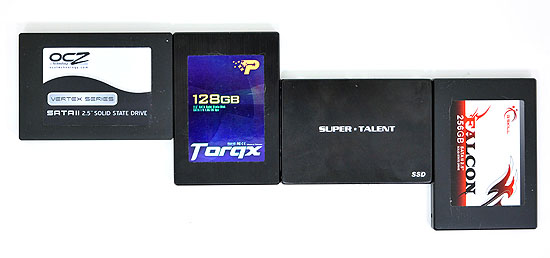
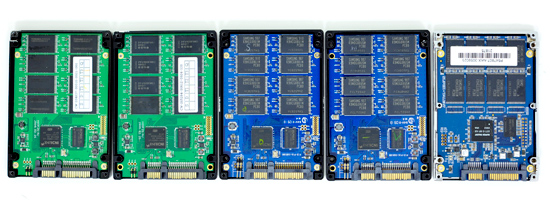
From Left to Right: OCZ Vertex Turbo, OCZ Agility, Patriot Torqx, G.Skill Falcon and Super Talent UltraDrive GX. Only the Super Talent drive uses a different PCB design.
Even the packaging doesn’t appear to vary much between manufacturers; that part I don’t really understand. All that seems to change is the artwork on the outside.
There are some minor differences between drives. Patriot ships its Torqx with a 2.5” to 3.5” drive bay adapter, a nice addition. The Torqx also comes with a 10 year warranty, the longest of any Indilinx based manufacturer. OCZ is next with a 3 year warranty, followed by Super Talent and G.Skill at 2 years.
Indilinx is still a very small company so it relies on its customers to help with validation, testing and even provide feedback for firmware development. As far as I can tell, every single Indilinx customer gets the same firmware revisions. Some vendors choose to rename the firmware revisions, while others do not. OCZ calls its latest stable firmware 1.30, while G.Skill, Super Talent and Patriot call it 1571.
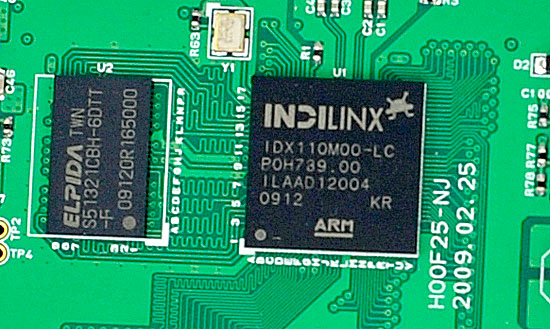
The Indilinx Barefoot controller (right), powered by an ARM core.
Of all the Indilinxites, OCZ and Super Talent work closest with the controller manufacturer. In exchange for their help in manufacturing and validation, OCZ and Super Talent also get access to the latest firmwares earlier than the rest of the manufacturers. Ultimately all manufacturers will get access to the same firmware, it just takes longer if you’re not OCZ or Super Talent.
You no longer need to use a jumper to upgrade your firmware, provided that you’re already running fw revision 1275 or later. If you have a previous version you’re pretty much out of luck as you need to upgrade to 1275 first before upgrading to anything else, and none of the manufacturers make it easy to do. Some don’t even offer links to the necessary firmware you’d need to jump to 1275. Thankfully pretty much anything you buy today should come nearly up to date, so this mostly impacts the original customers of the drive.
Performance, as you’d expect, is the same regardless of manufacturer:
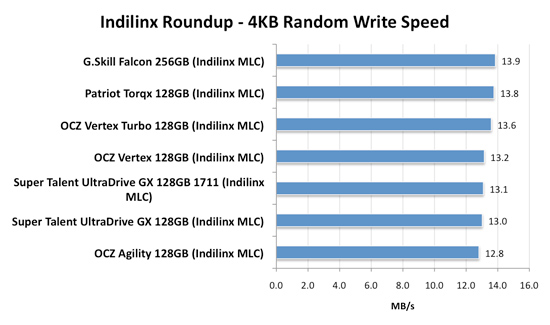
There's normal variance between drives depending on the flash/controller, that's why the OCZ Vertex is slower than the Patriot Torqx here but faster than the Super Talent UltraDrive GX. The manufacturer and size of the flash has more to do with determining performance. Samsung is used on all of these drives but the larger the drive, the better the performance. The 256GB model here will always be faster than a 128GB drive, which will always be faster than a 64GB, etc...
All of the drives here use the same firmware (1571) except for one of the Super Talent drives. That drive is using the beta 1711 firmware with TRIM support that was pulled.
When it comes to the best overall package, I’d say Patriot’s Torqx is the nicest for a desktop customer. You get a 3.5” adapter bracket and a 10 year warranty (although it’s difficult to predict what Patriot’s replacement strategy will be in 10 years).
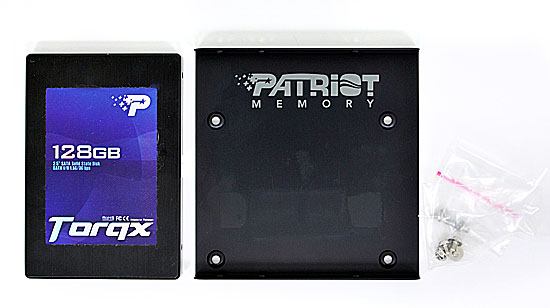
The Patriot Torqx bundle, complete with a 2.5" to 3.5" adapter.
Prices vary a bit between manufacturers, although most of the more expensive drives here have a $30 rebate to bring their prices in line:
| Price for 128GB | |
| Corsair Extreme Series | $384.00 |
| OCZ Agility | $329.00 |
| OCZ Vertex | $369.00 |
| OCZ Vertex Turbo | $439.00 |
| Patriot Torqx | $354.99 |
OCZ does do some unique things that the other manufacturers don’t such as deliver an overclocked drive (Turbo) and a drive with slower flash (Agility). There’s a Mac Edition of the Vertex, unfortunately it’s no different than the regular drive - it just has a different sticker on it and a higher pricetag.










295 Comments
View All Comments
Mr Perfect - Tuesday, September 1, 2009 - link
Probably demand. When I saw that price, I shopped around to see what was going on. Answer? Everyone else seems to be out of stock.Naccah - Tuesday, September 1, 2009 - link
I've been waiting to get an SSD till Win 7 released hoping that the prices would have stabilized somewhat by that time. The recent price fluctuation is disturbing as well as the availability of the X25 G2. When the G2 first hit Newegg I was surfing the site and could have grabbed one for $230, but like I said I was content to wait. Now I'm having second thoughts! and wondering if I should grab one if the price goes down again.gfody - Tuesday, September 1, 2009 - link
That doesn't explain the 160gb - it's not even in stock yet. I have been waiting a month for this drive to be in stock and here they more than double the price one day before the ETA date! It's an outrage.. if I'd known the drive was $1000 I would have bought something else.Way to screw your customers Newegg
araczynski - Tuesday, September 1, 2009 - link
A) your intro has the familiar smell of tomshardware, you'd do to be without that, its unbecoming.B) your final words smell of the typical big corp establishment mentality; bigger, faster, more expensive, consumers want! while if the market is any indication, is completely the opposite of the truth. people want 'good enough' for cheap, as the recent Wired magazine article more or less said. granted, Wired isn't the source for indepth technical reading, but it is a good source sometimes of getting the pulse of things...sometimes, still, more often than anything coming out of the mouths of the big corps.
C) everything in between A and B is great though :) Please leave the opinions/spins to the PR machines.
Personally, the cost of these things is still more than i'm willing to pay for, for any speed increase. the idiotic shenanigans of firmwares and features only present after special downloads/phases of the moon make me just blow off the whole technology for a few more years. I'll revisit this in say 2 or 3 years, perhaps the MLC's will finally die off and the SLC's (unless i have the 2 backwards) or something better rolls out with a longer lifespan.
Anand Lal Shimpi - Tuesday, September 1, 2009 - link
A) My intention with the intro was to convey how difficult it was for me to even get to the point where I felt remotely comfortable publishing this article. I don't like posting something that I don't feel is worthy of the readership's reception. My sincere apologies if it came off as arrogant or anything other than an honest expression of how difficult it was to complete. I was simply trying to bring you all behind the scenes and take you into the crazy place that's my mind for a bit :)B) I agree that good enough for cheap is important, hence my Indilinx recommendation at the end. But we can't stifle innovation. We need bigger, better, faster (but not necessarily more expensive, thank you Moore's Law) to keep improving. I remember when the P3 hit 1GHz and everyone said we don't need faster CPUs. If we stopped back then we wouldn't have the apps/web we have today since developers can count on a large install base of very fast processors.
Imagine what happens in another decade when everyone has many-core CPUs in their notebooks...
Take care,
Anand
DynacomDave - Tuesday, September 29, 2009 - link
First - Anand thanks for the good work and the great article.I too have an older laptop that has a PATA interface that I'd like to upgrade with an SSD. I contacted Super Talent about their MasterDrive EX2 - IDE/PATA. Their response was; We only use Indilinx controller for SATA drives, like UltraDrive series. We use Phison controller for EX2/IDE drives.
I want to improve performance not degrade it. I don't know if this will perform like the Indilinx or like the old SSDs. Can anyone help me with this?
bji - Tuesday, September 1, 2009 - link
There are a few more smaller players in the SSD controller game that don't ever show up in these reviews. They are Silicon Motion and Mtron. The reason I am interested in them is because I have a laptop that is PATA only (it's old I know but I love it and I want to extend its life with an SSD), and I am trying to get an SSD that works in it.Turns out the Mtron MOBI SSDs are not compatible with this laptop. I have no idea why. So I have put an order into eBay for an SSDFactory SSD and am crossing my fingers that it will work.
Mtron makes SATA SSD drives so they could be included in these reviews, and I don't know why they are excluded. It would be interesting to see how their controllers stack up. I personally own two Mtron SSD drives (both 32 GB SLC drives) that I tried to get to work in my laptop and failed to - so one is now the system disk in my desktop and it is very fast (at least compared to platter drives, maybe not compared to newer SSDs). The other one I am still trying to find a use for.
The only Silicon Motion controller drives I have seen are PATA drives so they clearly are a different beast than the SATA drives typically reviewed in these articles. But I would still be interested in seeing the numbers for the Silicon Motion controller just to get an idea of how well they stack up against the other controllers, especially for the 4K random writes tests. The PATA interface ought not to be the limiting factor for that test at least.
paesan - Tuesday, September 1, 2009 - link
I see NewEgg has a Patriot Troqx and a Patriot Torqx M28. What is the difference in the 2 drives.paesan - Tuesday, September 1, 2009 - link
After reading thru the Patriot forum I found the differences. The M28 has 128MB cache compared to 64MB cache on the non M28. The biggest difference is the M28 uses a Samsung controller instead of the Indilinx controller on the non M28. I wonder why they switched controllers.valnar - Tuesday, September 1, 2009 - link
It seems to be that using trim would make a "used" SSD faster, no doubt, but is it required? Would it be okay to buy an SSD for a Windows XP box and just set and forget it? Even used and fragmented, it appears to be faster than any hard drive. My second question is longevity. How long would one last compared to a hard drive?